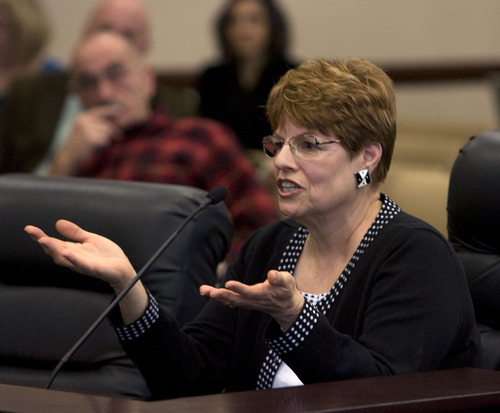This is an archived article that was published on sltrib.com in 2014, and information in the article may be outdated. It is provided only for personal research purposes and may not be reprinted.
Bucolic Bluffdale has cut the State Records Committee out of its appeals process after being ordered to cough up documents involving the National Security Agency's giant spy center.
The Bluffdale City Council voted unanimously last week to create its own records committee to hear such appeals. The City Council now also will act as the records panel.
The change comes in the wake of a records struggle earlier this year between the growing Salt Lake County suburb and The Salt Lake Tribune. The newspaper, through the Utah Government Records Access and Management Act, successfully appealed to the State Records Committee for documents surrounding water use at the NSA's massive Utah Data Center.
The Legislature created the State Records Committee to act as an independent panel to adjudicate records disputes with state agencies. But Utah law does not require cities to include the committee in the appeals process, said attorney Jeff Hunt, who specializes in public-records issues.
But open-government advocates argue that just because Bluffdale has the right to make this change doesn't make it the right thing to do.
The city's decision "will fuel suspicion with the public," said longtime government watchdog Claire Geddes.
"If the city [administration] doesn't want to provide the records, the City Council most likely will stand with them," she said. "What it does is eliminate many people from getting records. ... Most people don't have the resources to go to court."
Hunt, too, said he has long favored a system that mandates all political subdivisions include the State Records Committee in the appeals process. "You ought to have an independent forum to make your case."
Typically, when an agency denies a documents request, a group or individual may appeal to that agency's administrator. If denied again, a party may take its case to the State Records Committee. If that panel says no, the appeal can go to state court.
Cities need not make use of the State Records Committee — or even institute their own appeal boards, Hunt said. It depends on how each municipality formulates its records-access policy. Under Utah law, a city can offer a single administrative appeal before directing a subsequent challenge to state court.
Bluffdale City Attorney Vaughn Pickell said Tuesday that his city's change in appeals policy had nothing to do with the NSA records tussle.
Rather, the City Council decided to adopt a process similar to West Valley City's.
"It's a better procedure for records requests and for the city," he said. "It's more expeditious and likely to get a better result from the public's point of view — to get an opinion from the elected body."
Bluffdale denied The Tribune's initial request because "release of [NSA water] records could jeopardize security of governmental property, governmental programs or governmental records-keeping."
City Manager Mark Reid denied an initial appeal for the same reason.
But the State Records Committee voted 5-0 last March in favor of The Tribune's request, with committee member Patricia Smith-Mansfield stating that information on water usage and billing did not jeopardize NSA activities.



